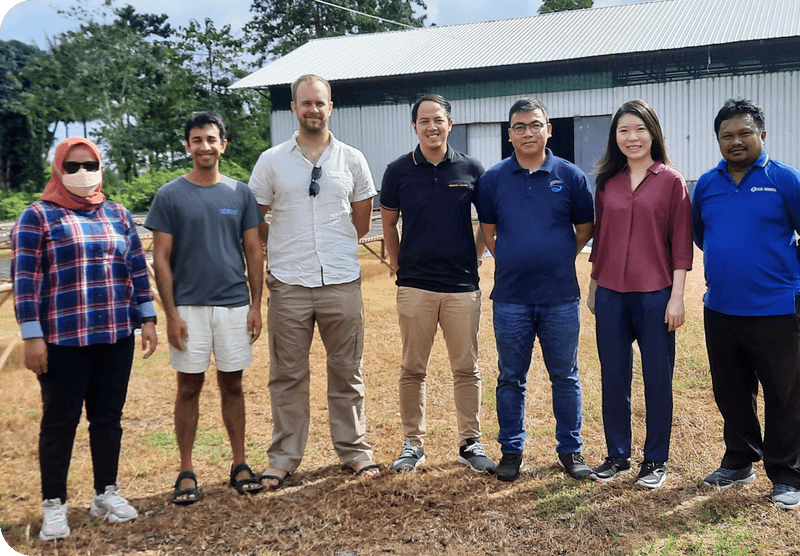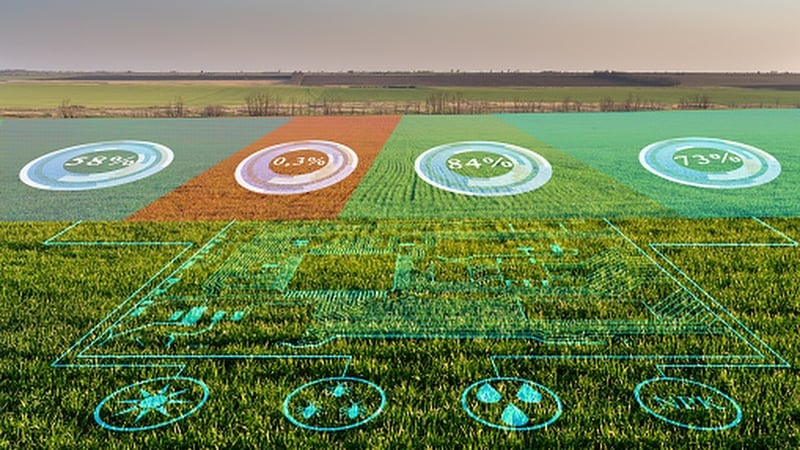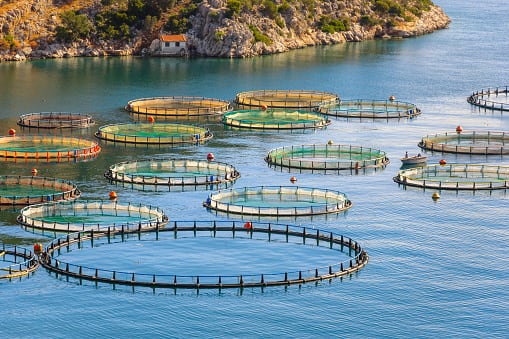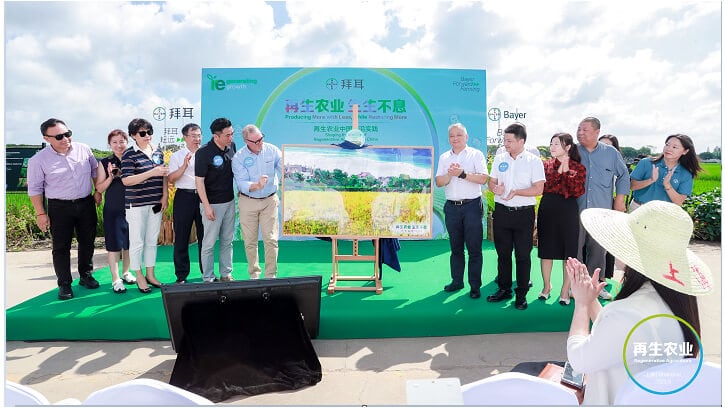Indonesia’s seaweed farming industry holds significant importance but faces crucial sustainability challenges, and CEO Fred Puckle Hobbs has stressed that internal and external collaboration is the key to doing so.
Seaweed is an essential ingredient in numerous food products and the industry contributes to Indonesia’s food security and international trade. This makes seaweed farming a vital source of income for coastal communities in the country, providing livelihood opportunities for thousands in rural and coastal regions. It is also crucial in maintaining marine ecosystems as it provides habitat, improves water quality and acts as a carbon sink, helping to mitigate the impacts of climate change.
However, Indonesia’s seaweed farming industry faces several sustainability challenges, one of which is environmental degradation from rapid seaweed farm expansion. This leads to habitat destruction, biodiversity loss and nutrient run-off, which then harms marine ecosystems.
Additionally, improper farming techniques — such as excessive fertilisers and pesticide use — can cause water pollution, algal blooms and damage to nearby coral reefs, while climate change can lead to rising sea temperatures and ocean acidification that can adversely affect seaweed growth, reducing yields and affecting farmers' income.
Furthermore, seaweed farms are susceptible to diseases and pest infestations, as well as land tenure conflicts, limited access to credit and lack of technical knowledge that can hinder the industry’s sustainable development and lead to social inequities among farmers.
Collaboration: A core lesson
Sea Green positions itself as a start-up focused dedicated to supporting the development and sustainable growth of the seaweed industry in coastal communities. It also seeks to use its digital platform to make a significant contribution to livelihood resilience, food security, and climate change.
Speaking to AgTechNavigator, CEO Fred Puckle Hobbs said Sea Green has “flipped the paradigm at by reimagining traceability”. Bearing in mind that farmers must have the necessary infrastructure to produce sustainable, high-quality product, the company’s platform revolves around farmers as its primary users and beneficiaries.
“If farmers have a scalable solution and data log to consolidate all their information, we can create feedback loops and useful tools which help them to produce higher quality seaweed and increase their margins,” Hobbs said. “Sea Green differentiates itself by creating an end-to-end solution that puts farmers first, ensuring transparency and traceability remain an outcome of access to data, rather than its main goal.”
Hobbs further said that one of the key lessons he has learnt in Sea Green’s journey is “the importance of collaboration, not just within the team but across partnerships”.
“What we are doing is very new and rapidly changing. Although seaweed has been around for a long time, there have been almost no changes to the supply chain’s operating dynamics. With this in mind, we needed core team members who are skilled experts with experience in the field but who are also not afraid to challenge status quos and come up with innovative solutions to new and evolving problems.”
To this end, the company has assembled a team that it says shares one main value — a desire to develop a sustainable future for coastal seaweed farmers. According to Hobbs, hiring was “almost exclusively carried out for attitude rather than specific technical skill”, as industry expertise was limited and relatively academic. As such, he said, it was important to find “motivated generalists who were able to apply themselves across a wide variety of situations”.
In terms of external collaboration, Hobbs said, “Value chains rely heavily on working together and whilst fragmentation may have occurred at many levels of aggregation, facilitating cooperation is a critical goal for any form of sustainable development.
“As a software solutions provider, Sea Green has to embody this value still further, to ensure enduring and successful deployment of its system among coastal communities. This means giving staff and partners the right tools to communicate effectively in a range of circumstances, many of them challenging.”
This has led to Sea Green partnering with technical, academic, commercial and advocacy partners who provide a variety of services that Hobbs believes greatly enhance the overall company proposition. For instance, the start-up’s solutions partner, FinServ Experts, is a team of financial services and digital technology experts that first helped to conceptualise the Sea Green platform and construct a prototype.
An ocean of possibility
A member of the Ocean Risk and Resilience Action Alliance (ORRAA), Sea Green has also partnered with Cargill, Xylem Inc. and Deakin University’s Blue Carbon Lab. These partnerships have, in turn, positively influenced the start-up’s relationship with MARI Oceans, a community-based seaweed farming organisation seeking to develop sustainable business models to farm and harvest seaweed in harmony with the environment. In doing so, it hopes to empower seaweed farmers and secure their livelihoods.
MARI Oceans has been identified as one of Cargill’s future suppliers, while Sea Green’s partnership with Xylem Inc has provided MARI Oceans with water quality-monitoring sensors to fulfil the long-term goal of integrating such information into the digital platform.
Hobbs said: “MARI Oceans and Sea Green were created as products of the same detailed research report on the Indonesian seaweed industry. This shared origin has led to a symbiotic relationship, aiming to empower seaweed farmers and create sustainable supply chains.
“Sea Green collaborates closely with MARI Oceans to understand the specific needs and challenges these farmers face and identify areas where technology can play a vital role in enhancing farming practices, making them more efficient and effective.”
He added that MARI Oceans benefits from Sea Green’s technological expertise and product knowledge as both parties collaborate to provide innovative digital solutions and tools that “streamline processes within the supply chain”, including enhancing traceability, optimising logistics and facilitating transparent transactions.
In addition, the partnership offers Sea Green first-hand insights into the challenges Indonesian seaweed farmers face, allowing the company to develop tailor-made solutions that directly address these challenges. “By incorporating their feedback and needs into our technology, we ensure our digital infrastructure is practical, user-friendly and meets the requirements of the end-users — the farmers,” said Hobbs.
Adoption and funding challenges
Despite its aforementioned progress, Sea Green still faces challenges, particularly in adoption and funding. One of the main difficulties it faces is relatively low digital literacy, as well as limited access to finance and technology amongst Indonesian seaweed farmers.
Hobbs said, “Many farmers are reticent to adopt new technologies or upgrade to better equipment because of the high associated costs, unless there is a clear benefit. Seaweed supply chains are also quite traditional in nature and have yet to be digitalised. Most of the processes are very manual — for instance, recording their yields is done on a whiteboard or paper.”
He added that Indonesia’s supply chain is also complex and fragmented, with up to nine levels of aggregation. A lack of traceability poses a challenge but also an opportunity for Sea Green to create with an end-to-end solution to give both buyers and farmers a clear overview of the seaweed’s journey, from farm to factory.
Sea Green aims to facilitate a more democratic exchange within the seaweed value chain by creating digital infrastructure focused on three main features: farm management, data curation and a digital marketplace — all of which are expected to promote a transparent, efficient value chain that benefits its various stakeholders equally.
“Beyond our tech, we also work closely with MARI Oceans, who maintain consistent engagement with seaweed farmers. Our team regularly visits sites in South Sulawesi to conduct in-depth product and market research on the needs of farmers and the wider supply chain,” Hobbs said.
When it comes to fundraising, a lack of education among investors regarding the industry’s potential, dynamics and risks is a key challenge. The blue economy in general suffers from a critical lack of data, which makes it difficult for funders and projects to be matched based on risk profile.
Simultaneously, due to the nature of the operating environment, propositions are often low-margin and thus, require considerable scale. Consequently, they typically need high up-front expenditure — usually for CapEx on assets (or in Sea Green’s case, software) — and longer investment horizons to generate returns.
Hobbs said: “To mitigate this, Sea Green and MARI Oceans have invested time in analysing and understanding the potential impact of our initiatives, in order to be able to access more investors and funders. Using the SDG (Sustainable Development Goals) framework, we were able to identify contributions at target level, creating monitoring frameworks for future operationalisation and leveraging these to market impact as part of our investment proposition.”
Accessible education
The lack of education that has resulted in the abovementioned adoption and funding challenges has led Sea Green to spend significant amounts of time making knowledge about seaweed accessible to everyone.
“There is quite a gap in terms of everybody’s perception of seaweed; not many are aware of its varied use cases or that it is found in a range of products, from toothpaste to makeup. Our main goal is to showcase its potential as one of the solutions to mitigate climate change — (whether as a bio-plastic, sustainable livestock feed or bio-stimulant fertiliser,” said Hobbs.
To achieve this goal, Sea Green employs a two-pronged strategy: firstly, it leverages its relationship with MARI Oceans to create marketing materials that explain the impact of their connected businesses amongst coastal communities, which Hobbs said “has the added benefit of documenting the progress of the ventures and the evolution of our shared thinking”.
Secondly, Sea Green liaises with corporate, venture investment and media partners to attend different international conferences and industry events. This enables the company to “articulate the value of the Sea Green proposition and the potential of the seaweed industry, and learn from other ocean and aquaculture investors”. This way, Hobbs believes, Sea Green can continue to tweak its value proposition for maximum value to seaweed farmers and their coastal communities.
In the near future, Hobbs said, there would be further refinement of Sea Green’s MVP scope, as well as engagement with relevant technical partners to build and deploy the first iteration of the platform in Indonesia.




